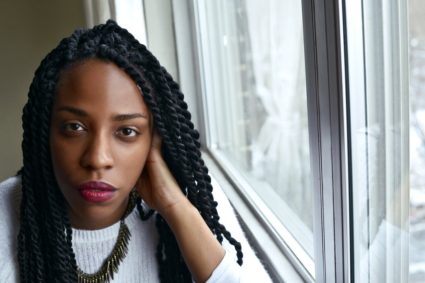
Valentino Garavani, the iconic Italian designer known for his glamorous gowns and signature “Valentino red,” has died at 93.

Our June 2020 pick for the PBS NewsHour-New York Times book club is Lauren Wilkinson's "American Spy." Become a member of the Now Read This book club by joining our Facebook group, or by signing up to our newsletter. Learn more about the book club here.
In "American Spy," novelist Lauren Wilkinson tells the tale of a young intelligence officer who is accustomed to taking on different identities. When she joins a task force aimed at undermining the charismatic leader Thomas Sankara and becomes interested in his policies, her sense of what it means to be a good spy and American begin to fundamentally change.
One book that Wilkinson believes deserves more attention — Nella Larsen's "Passing" — is also about a woman navigating different identities. While the main character of that story is multiracial, her husband doesn't know she has black ancestry. Wilkinson told the PBS NewsHour that Larsen's novel was "light years ahead of its time," but has been underappreciated because the author was a black woman publishing in the 1920s and '30s.
Below, Wilkinson talks about other sources of inspiration, and how she came to write "American Spy" as her debut novel.
I get up early. I like to be out of bed by 5 a.m. at the latest. I have a cup of coffee, walk the dog, and then begin to work. I keep at it until lunch at noon, and then I spend the rest of the day responding to emails and touching base with friends and family.
Oh, it's so hard to pick just one! As a young child, I was obsessed with "Mufaro's Beautiful Daughters" by John Steptoe, because it's such a beautiful picture book. I also loved "Matilda" by Roald Dahl, "The Agony of Alice" by Phyllis Reynolds Naylor and "The Saskiad" by Brian Hall. Actually, I recently wrote Brian Hall a letter (on a day that I had a little downtime at home because of COVID-19) to tell him just how much his book meant to me when I was 13.
Nella Larsen's novel, "Passing." Larsen was truly light years ahead of her time. She's gotten a little more attention recently, but she was a black woman publishing in the 1920s and 1930s, and was definitely underappreciated as a result. And I recently wrote the introduction for Modern Library's new edition of "Nada" by Carmen Laforet, which is excellent. The book is set in the 1940s, during Franco's regime, and is about an 18-year-old girl who goes to live with extended family in Barcelona for the first time. Franco is never explicitly acknowledged, but that's the point, I think, because his dictatorship feels so present in that silence.
Know the part of the day that you write best. Writing is difficult enough, so don't work against yourself by writing when you're tired or your mind doesn't feel clear.
Actually, it was when my agent — having read the short story the novel is based on — asked if I thought I could write a novel. I said yes because I certainly wasn't going to tell her no! Similarly, I knew it was finished when my editor told me it was. She saw that I'd become obsessed with trying to get the book "perfect," had developed tunnel vision, and was getting dangerously close to burning out. So, she told me to stop for the sake of my career, and I'm glad she did.
Sustain our coverage of culture, arts and literature.